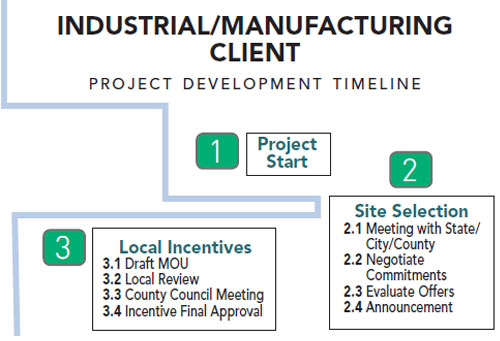Goals: A couple of common factors drive such an investment decision. One is to shorten logistical supply paths for significant customers with existing operations in the United States. Another is to hedge against fluctuations in raw material pricing, currency, taxes, and trade duties.
Teaming: Most companies designate internal project teams comprised of members experienced in production, logistics, and finance. For larger projects, companies should also include additional members experienced in human resource management, government relations, taxation, and real estate/construction management.
Definition of Project Scope: Once the internal team is staffed, companies then work to define the facility design and location. During this stage, many companies tap either internal resources familiar with this process in the United States or engage engineering and site consultants to develop the criteria for the project. The end work product for this stage is a summary of the internal business case and the external summary of the jobs to be created and investment required to establish and grow the facility over the first five years.
Project Execution: Once the scope of the project has been established by the project team, the internal members and external advisors should meet to break down the transaction into project management components and timelines. This exercise further anchors the project scope definition in executable form, and sets realistic management objectives for meeting production deadlines and satisfying customer expectations. These meetings typically involve site selection, incentive negotiation, construction, production line commissioning, and hiring aspirations.

The company or its consultant typically shares the project summary with more than one state, regional, or county economic development office. The company or its consultant develops a list of candidate sites that meet the criteria established by the company. Once the list of qualified sites is developed, the company selects those that best match the project criteria. Selected state and local governments then respond with incentive proposals for comparison and analysis. Each company and consultant approaches this process in a slightly different way, but the goal is to narrow the candidate sites down to just a few.
Many states have unique requirements relating to the granting of incentives. Some allow a site selection announcement once the incentives are agreed upon. Some prohibit an announcement until certain actions are taken by the state and local governments. The signing of real estate purchase agreements must be discussed and coordinated in advance with state and local requirements.
In many states, there are incentive agreements and compliance regulations that must be reviewed and understood by the company. Incentives can be offered in a variety of forms, which vary from state to state and within regions of each state. Many states effect property tax reduction for new and expanding companies through economic development agreements. For larger investments creating significant new jobs, refundable tax credits and grants are often offered. Many of these incentives are tied to transactional requirements, including the execution of documents with compliance requirements. These should be reviewed by experienced legal advisors.
Many states have unique requirements relating to the granting of incentives.
Purchasing Real Estate: Once a U.S. site is selected, a real estate purchase contract must be prepared between buyer and seller. Before entering into a real estate contract, the company must establish an entity in the United States. A discussion of the choice of entity can be complex, and is best discussed with the company’s legal and tax advisors.
In the United States, the primary rights and obligations of the buyer and seller are controlled by the purchase agreement itself. In many other countries, codes and statutes govern a significant portion of those rights and obligations. This difference becomes evident as discussions proceed. Companies investing in the United States should seek legal advice on these agreements, and not assume that any agreement offered by a seller is standard.
In addition, the general duty to inspect the property being offered falls on the buyer. In many countries around the world, the government certifies the correctness of title to and sometimes the condition of the land. In the United States, the buyer must retain an attorney to conduct due diligence into the status of title, boundaries, easements, restrictive covenants, and zoning regulations affecting the land. To do this, the company customarily must also engage surveyors, environmental consultants, and geotechnical engineers. If the company is buying an existing building, a mechanical engineer must be hired to survey the condition of the building. It is customary for the company to have up to 90 days to confirm the condition of the property. The company must also ascertain what types of federal, state, and local permitting must be obtained prior to using the property for its intended use. Property title insurance is typically purchased to protect the buyer from unknown defects to the title conveyed by the seller to the buyer.
Closings on real property are typically handled by the attorneys for the buyer and seller. If the property is being used as agricultural property by the seller at the time of closing, certain federal filings must be made regarding the conversion of agricultural property to commercial or industrial use.
Construction: Companies building a new facility or expanding an old one typically engage an engineering consulting firm and often an architectural firm to develop plans and specification for bid documents. There are a number of ways to structure the construction process in the United States, and consultation with a construction law attorney regarding this structuring and the drafting of construction documents is often prudent. For foreign companies with limited ability to fully and continuously support a supervisory presence in the United States during the construction of a new facility or expansion, the hiring of a project management firm is often recommended.
Human Resource Planning: This planning process often commences early in the project scope phase. It is important to understand the immigration laws affecting the utilization of existing company personnel in the United States, and the possible hiring of outside personnel for transfer here. The laws are technical, and as of this writing, potentially subject to significant change. Early consultation with an immigration attorney is advised.
During the site selection phase, it is important to consult with state and local officials directly or through site consultants regarding workforce availability, skill levels, and state training programs. The scope, content, flexibility, and administrative requirements of these training programs vary from state to state.
In the United States, the primary rights and obligations of the buyer and seller are controlled by the purchase agreement itself. Other employment-related issues to be evaluated are whether or not your sites are in states that (1) are right-to-work and (2) have at-will employment. In a right-to-work state, employees cannot be compelled, as a condition of employment, to join or not join or to pay dues to a labor union. At-will employment means that employment can be terminated by the company for any reason without warning.
Finally, the U.S. subsidiary entity of the foreign company should review and adopt employment policies customary for the region and industry. These are usually contained in an employment manual, which is normally prepared by an employment attorney. Once the subsidiary company is established, it can also evaluate and consider appropriate employee benefits.
Commercial Contracting: When the U.S. subsidiary of the foreign company starts transacting business in the United States, it should have developed standard terms and conditions of purchase and sale. Additionally, personnel working for this subsidiary should receive training on U.S. commercial transactions and the applicability of the Uniform Commercial Code.
Other Concerns: This article presents a transactional overview only. Based upon the target market sectors of the subsidiary, additional topics to be addressed could include — but would not be limited to — international, state, and local taxation, transfer pricing, customs law, export control regulations, antitrust law, federal and state industry regulations, environmental law, and protection of intellectual property rights.
Disclaimer: This material is provided as information and is not intended as legal advice. You should not act upon general information on legal matters without seeking counsel regarding your particular situation. For advice on specific legal matters, please contact your legal counsel.
For a more in-depth review of legal issues related to foreign direct investment in the United States, please request a copy of our Legal Aspects of Doing Business in the United States by contacting the author.

